Product Description
With proper supports in place, people with memory loss can be taught to remember information and even learn tasks that will promote their independence. Spaced Retrieval Step by Step: An Evidence-Based Memory Intervention describes a simple, effective process that can significantly improve people’s daily performance, safety, and confidence.
This practical guide takes a fresh approach to Spaced Retrieval, teaching this innovative process step by step so you can better assist people in learning important actions and information, such as when to take medications or how to use a walker. With this proven memory-training strategy, you help people learn and store specific information that, with practice, can be easily accessed and retrieved.
Illustrative case examples throughout demonstrate the numerous ways Spaced Retrieval can be used to help people with memory loss eliminate repetitive questioning, reduce anxiety, improve recall of important facts, increase safety, and much more. An additional feature is an instructive timeline that illustrates the historical breadth and depth of research supporting this useful strategy.
Filled with practical insights and advice for care partners, this book also provides:
- screening and program forms (also available as downloadable PDF files)
- an easy-to-follow protocol for practicing Spaced Retrieval
- advice and tools for developing visual cuing
Speech-language pathologists, occupational and physical therapists, nurses, and home care professionals at all levels, as well as family members, can use Spaced Retrieval to positively impact the lives of people with memory loss.
- Spaced Retrieval Screening Form
- Reading Screening Form
- Spaced Retrieval Data Form
- Practice at Remembering (care partner handout)
- Spaced Retrieval Research Timeline
In the News
Stepping Up to the Plate (The ASHA Leader, October 2015)
Is it possible for people with dementia to eat familiar and favorite foods safely? A growing number of clinicians say yes, offering suggestions for SLPs who want to avoid recommending the often-rejected modified diet.
Building a Memory (The ASHA Leader, August 2015)
SLP Jeanette Benigas will describe how clinicians can use the spaced retrieval method to help people learn new behaviors during voice treatment.

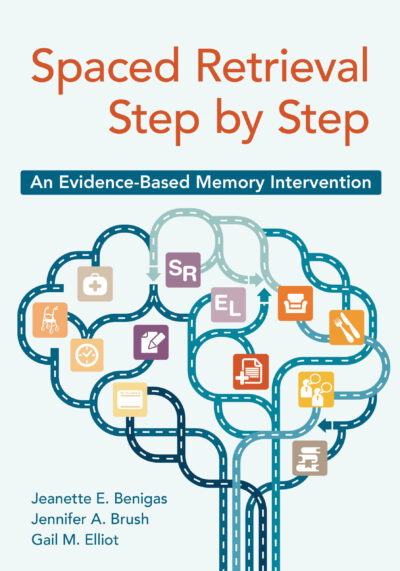
 Jeanette Benigas, Ph.D., CCC-SLP, is an Assistant Professor of Communication Sciences and Disorders at West Chester University (Pennsylvania). She has worked extensively as a speech-language pathologist in pediatrics in both private practice and school settings and with adults in post-acute, long-term care, and home health settings. In her work with adults, Dr. Benigas has pursued research into improving quality of life for persons with dementia, particularly related to eating and swallowing impairments. Her research has focused on evaluating reading comprehension abilities in people with dementia for use of visual aids and using Spaced Retrieval to teach swallowing strategies to avoid unwanted dietary modifications. She speaks nationally to fellow speech-language pathologists and continues to practice privately. With a bachelor’s degree in Speech-Language Pathology from The University of Toledo and a master’s degree in the field from Eastern Michigan University, Dr. Benigas completed a Ph.D. in Speech and Hearing Science and Interdisciplinary Specialization in Aging from The Ohio State University.
Jeanette Benigas, Ph.D., CCC-SLP, is an Assistant Professor of Communication Sciences and Disorders at West Chester University (Pennsylvania). She has worked extensively as a speech-language pathologist in pediatrics in both private practice and school settings and with adults in post-acute, long-term care, and home health settings. In her work with adults, Dr. Benigas has pursued research into improving quality of life for persons with dementia, particularly related to eating and swallowing impairments. Her research has focused on evaluating reading comprehension abilities in people with dementia for use of visual aids and using Spaced Retrieval to teach swallowing strategies to avoid unwanted dietary modifications. She speaks nationally to fellow speech-language pathologists and continues to practice privately. With a bachelor’s degree in Speech-Language Pathology from The University of Toledo and a master’s degree in the field from Eastern Michigan University, Dr. Benigas completed a Ph.D. in Speech and Hearing Science and Interdisciplinary Specialization in Aging from The Ohio State University. Jennifer Brush, MA, CCC-SLP, is the Director of Brush Development, USA and the Program Director, Montessori Education for Dementia, St. Nicholas Montessori College, Dun Laoghaire, Ireland. Jennifer serves on the Association Montessori Internationale (AMI) Advisory Board for Montessori for Aging and Dementia, and she is the only AMI Certified Trainer of Trainers for Montessori for Aging and Dementia in the US. Jennifer is the co-author of several nationally recognized books on dementia.
Understanding the particular needs of healthcare organizations and families engaged in dementia care she brings more than 20 years of experience as both a leading researcher and direct-care coach in this complex field. She is a nationally recognized speech-language pathologist known for her work in the areas of memory and environmental interventions for people with dementia. She has served as the principal investigator on applied research grants that examined issues pertaining to HIV/AIDS dementia, hearing impairment, dining, swallowing disorders, and the long-term care environment. Ms. Brush has served as Chair of the Professional Development Committee of the American Speech-Language Hearing Association Gerontology Special Interest Division and on the Editorial Review Board of
Jennifer Brush, MA, CCC-SLP, is the Director of Brush Development, USA and the Program Director, Montessori Education for Dementia, St. Nicholas Montessori College, Dun Laoghaire, Ireland. Jennifer serves on the Association Montessori Internationale (AMI) Advisory Board for Montessori for Aging and Dementia, and she is the only AMI Certified Trainer of Trainers for Montessori for Aging and Dementia in the US. Jennifer is the co-author of several nationally recognized books on dementia.
Understanding the particular needs of healthcare organizations and families engaged in dementia care she brings more than 20 years of experience as both a leading researcher and direct-care coach in this complex field. She is a nationally recognized speech-language pathologist known for her work in the areas of memory and environmental interventions for people with dementia. She has served as the principal investigator on applied research grants that examined issues pertaining to HIV/AIDS dementia, hearing impairment, dining, swallowing disorders, and the long-term care environment. Ms. Brush has served as Chair of the Professional Development Committee of the American Speech-Language Hearing Association Gerontology Special Interest Division and on the Editorial Review Board of  Gail Elliot, BASc, M.A., Gerontologist and Dementia Specialist, is the Founder and CEO of DementiAbility Enterprises, Inc., an online service connecting research with practice in the field of dementia to enhance functioning and provide meaningful engagement for people with dementia (
Gail Elliot, BASc, M.A., Gerontologist and Dementia Specialist, is the Founder and CEO of DementiAbility Enterprises, Inc., an online service connecting research with practice in the field of dementia to enhance functioning and provide meaningful engagement for people with dementia (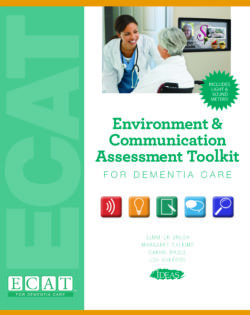
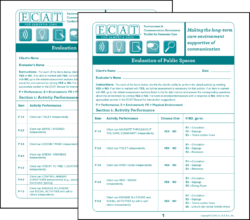
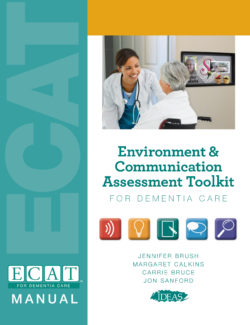
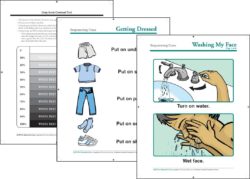
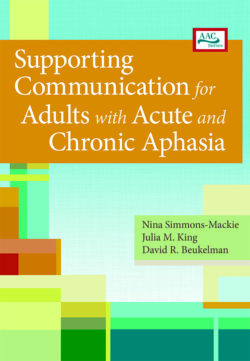
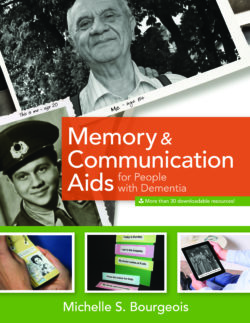
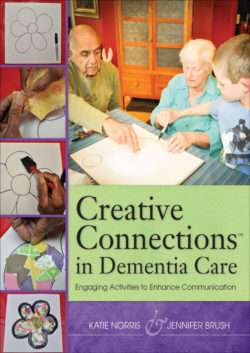
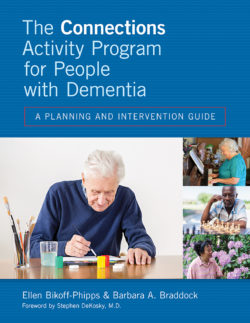
Administrator –
“Dementia care has become a very staggering issue in Japan as the population of over-65-year olds now comprises more than 25% of the total population. This is an unprecedentedly high ratio that no other country in the world has ever experienced. Step-by-step descriptions of the SR technique, together with a variety of case studies outlined in this book will definitely help implement effective care for people with memory loss in many countries with different cultures facing similar aging issues.”
—Toshiko Watamori, D.M.Sc.
Professor Emeritus, Hiroshima Prefectural College of Health Sciences
Japan
Administrator –
“As a Montessorian focused on care for the aging, this is a must read. Spaced Retrieval Step by Step has been needed for a long time, and I celebrate its arrival. The ability to change lives by improving quality of life for persons living with dementia and their caregivers is within the pages of this fabulous book. With a technique that is easy for anybody to learn and with the potential to achieve amazing outcomes, this is one of the most powerful books ever written to help people living with dementia do so with dignity, respect, and independence.”
—Anne Kelly, Managing Director
Montessori Ageing Support Services
Australia
Administrator –
“Spaced Retrieval Step by Step [authors] Benigas, Brush, and Elliot describe theoretical foundations of SR training and, as promised by the title, walk the reader through each step of the SR training process. They provide plenty of examples and explanations, and how SR can be used to train the use of a variety of memory aids, showing the utility of SR methods across training targets. This detailed and practical manual will be a staple for clinicians.”
—Lyn Turkstra, Ph.D., CCC-SLP, BC-ANCDS
University of Wisconsin-Madison